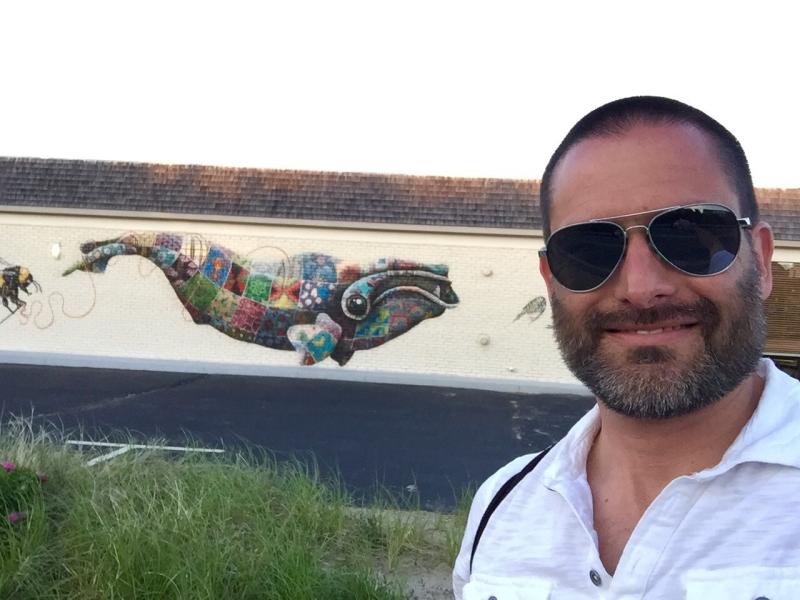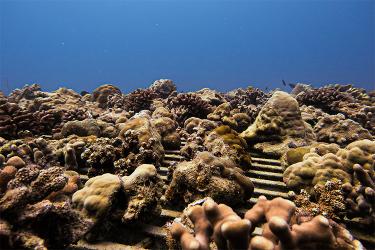What do you do at NOAA Fisheries?
I am a marine mammal biologist and have been at NOAA Fisheries for 26 years. I am currently the Deputy Chief for the Marine Mammal and Sea Turtle Conservation Division in the Office of Protected Resources. I work with an amazing team of colleagues on a suite of conservation issues for whales, dolphins, porpoises, seals, sea lions, and sea turtles. I help supervise the scientists and managers in the Marine Mammal Health and Stranding Response Program. The program coordinates and oversees the agency’s nationwide emergency response efforts to rescue marine mammals in distress, and investigates the health and health trends of marine mammal populations. I also work closely with our regional offices to develop and promote safe and responsible marine wildlife viewing practices. We encourage the public to learn about the animals in the wild without disturbing or harming them.
Tell us about your educational and career journey.
I was born and raised in Washington, D.C., so I am a city kid by birth but an ocean kid at heart. In my early years, I spent many weekends on the Chesapeake Bay and summer vacations at Atlantic coast beaches, which instilled a strong affinity for the ocean in me. I first became enamored with marine mammals at a very young age after visiting the Smithsonian’s National Museum of Natural History and experiencing the life-size models of whales and dolphins in the Ocean Hall. At the time, the museum had one of the few life-size models of a blue whale that existed in the world, and it was awe-inspiring to behold, especially as a small child.
I received my undergraduate degree from Boston University where I majored in Biology with a specialization in Marine Science and minored in Italian Studies. The Marine Science curriculum included a year at the Marine Biological Laboratory in Woods Hole, Massachusetts. It was amazing to live on Cape Cod in a community so dedicated to marine science and conservation. I began volunteering at the New England Aquarium on weekends during my junior year of college. I assisted the wonderful curators who worked with the marine mammals in human care and responded to stranded animals. I volunteered for many years at the Aquarium and that experience opened numerous doors for me. I worked for several years for the pioneering marine mammal scientists at the Woods Hole Oceanographic Institution (WHOI). I then worked at the Chicago Zoological Society/Dolphin Biology Research Institute on a suite of research projects investigating marine mammal behavior, acoustics, life history, and natural history.
One of the projects I worked on while at WHOI in the early 1990s was for NOAA Fisheries’ Office of Protected Resources to document the behavior of dolphins in “Swim with the Dolphin” programs at public display facilities. These were a relatively new phenomenon at the time and extremely controversial. The research we conducted was well-received, peer-reviewed, and published, and helped improve safety for the dolphins and people alike. That experience opened my eyes to the world of marine mammal policy and legislation, and inspired me to join NOAA Fisheries in 1995.
After working for several years in NOAA Fisheries’ Office of Protected Resources, I pursued a master’s degree from 2007–2008 at the University of St. Andrews in Scotland at their Sea Mammal Research Unit. I was able to do that thanks to the great support of NOAA Fisheries’ Advanced Studies Program and my office. That was another wonderful life experience that enabled me to learn about marine mammal science, conservation, and legislation from a diverse and international perspective.
Why is your work at NOAA Fisheries important?
The work we do in the Marine Mammal Health and Stranding Response Program is important because it directly supports protection and conservation of marine mammals, including several species that are threatened or endangered. Over the past two centuries, many populations of marine mammals were severely reduced or driven to extinction by commercial whaling, seal hunting, or interactions with fishing. Congress passed the Marine Mammal Protection Act of 1972 and the Endangered Species Act of 1973 in part to stop commercial hunting and exploitation of the animals, and to help support recovery of depleted, threatened, or endangered populations.
The Marine Mammal Health and Stranding Response Program plays an important role in the ongoing efforts to recover those populations. We assist animals in distress and provide veterinary care, investigate mortality and morbidity events to determine causes, and document overarching health and health trends in wild populations. Marine mammals are long-lived mammals like us, and some species inhabit the same coastal waters we use or eat the same types of fish that we do. They are important sentinels of ocean and environmental health, and therefore human health. Whenever we find a dead or dying marine mammal on our shores or at sea, it’s important we try to find out the cause in case it can be attributed to humans or could impact human health.
What does Pride Month mean to you?
Pride Month means many things to me. It is an important opportunity to celebrate how far we have come in advancing LGBTQ+ rights and acceptance over the years while also being an important reminder of how much more needs to be done to ensure equality and freedom for everyone. Despite the recent hard-won victories for gay marriage, employment protections, and better representation in mainstream media, there are still people working overtime to overturn the advancements made to date. Pride Month is an annual way for our community to showcase how much we are indeed an integral part of all communities in our societies regardless of gender, race, religion, or cultural background. It is also a chance for our straight allies to show support and solidarity for their LGBTQ+ family members, friends, and colleagues.
Pride Month is also an important opportunity for us to honor and celebrate the courageous LGBTQ+ civil rights pioneers of the past who stood up and spoke out against bigotry and hate, particularly in the decades when it was dangerous and life-threatening for them to do so. We stand today on the incredibly strong shoulders of many fearless and fabulous women and men who took to the streets, airwaves, boardrooms, and courthouses to ensure the LGBTQ+ community has the same freedom and equality as the straight community.
How has being a part of the LGBTQ+ community shaped or inspired your work?
Being a part of the LGBTQ+ community has definitely instilled in me a deep and profound sensitivity and empathy for the plight of species like marine mammals and sea turtles that have been exploited, severely harmed, or driven to extinction. I see strong parallels in the important work we do to protect and save individual animals or entire species with the important work of civil rights champions who are dedicated to equality and protection of those who have been historically exploited, discriminated against, or disenfranchised, such as women, people of color, and LGBTQ+ People. I see all of us helping to give voice to the voiceless.
What advice do you have for today’s youth interested in a marine career?
Do what you love and love what you do—We get a finite number of trips around the sun, so work hard to pursue your dreams. The past year underscored how life as we know it can change in an instant—and since we spend most of our adult lives working, be fulfilled with your work purpose.
Study hard and become well-rounded—The marine science field is popular and can be competitive, so definitely focus on your studies. If you’re passionate about a particular species, be sure to learn as much about them as you can. That includes learning about their habitats, their role in the greater ecosystem, and the laws (and politics) swirling around the efforts to protect and conserve them.
Know the history of your chosen field—Marine and oceanographic sciences were pioneered by visionary scientists and managers who pushed the envelope and problem-solved to obtain the best available scientific information and advance conservation. Learning about and understanding what they experienced and accomplished helps inform and inspire future scientific work—just as learning about the history of civil rights pioneers helps inform and inspire future work for freedom and equality.
Pursue internships or volunteer positions in your chosen field to get experience—Good grades are important but not the only thing needed to get ahead. Real-life experiences working in the field are always helpful on multiple levels to learn skills and see which aspects of the work resonate the most. Some organizations or field projects offer internships or volunteer opportunities that can be extremely rewarding and inspiring.
Avoid burn out—Many of the issues in the marine science and conservation field can be intense, overwhelming, and all-consuming, especially those involving threatened or endangered species where the stakes and pressure are high. Be sure to have hobbies and interests outside of work to give yourself a break, which will in turn help ensure you can work on what you love for the long haul.
Never stop learning—The fields of science, conservation, and policy are constantly evolving and improving as we learn more and technologies improve. Be active in scientific professional societies, aspire to take additional classes or training well after you graduate, and keep up-to-date on the best available science




